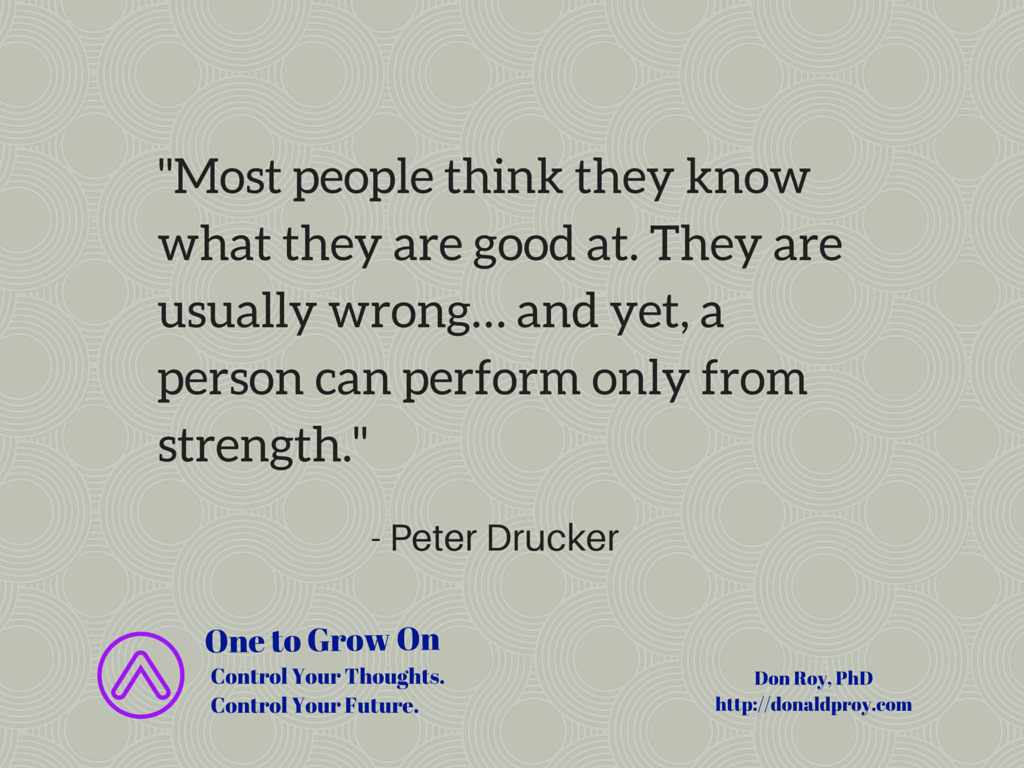When management expert Peter Drucker talked, people listened. The Austrian born Drucker continued teaching and writing up until his death in 2005 at age 95. People still listen today as his guidance continues to influence the development of organizations and business professionals. His quote on the role of strengths in one’s personal growth is representative of his work- profound yet straightforward in presentation. This quote is worth reflecting on to consider whether you are making the most of your strengths… or if you even know what they are.
What Are Strengths Anyway?
Identifying a personal strength simply means you have a trait, talent, or skill that you are able to use for good, whether that good benefits you or other people. Some of these strengths may be innate such as personality traits. If you are self-confident or compassionate, these traits can be used to your advantage. Other strengths may be learned through training and education, either formal education or self-directed learning. Some strengths developed this way are considered hard skills. For example, earning the designation of Certified Public Accountant (CPA) is the culmination of years of training and preparation for a rigorous CPA examination.
Other skills developed are considered soft skills as they are not as tangible or directly observed. Yet, it could be argued that soft skills are as important (if not more important) to personal and professional growth. For example, critical thinking and communication skills are highly valued by employers. While these skills can be sharpened through education and training, there is no test that certifies one as a proficient critical thinker or outstanding communicator. Yet, the addition of these soft skills are indispensable to professional development.
Finding the Answers
It may be easy to convince someone of the need to know their strengths and understand how strengths benefit them. The challenge can be in uncovering strengths so that you know what they are. Otherwise, we can fall in the trap that Peter Drucker describes of not having a grasp on our strengths. So, where do we find answers to the question “what are my strengths?”
- Ask others. Start with a source of information based on observation and experience, and that source is people around you with whom you interact. These people could be bosses, teachers, mentors, or close friends. Listening to people close to you to get their candid assessment of strengths could reveal qualities about yourself that you cannot see.
For example, I once was tasked with leading a work group to develop a strategic plan for our unit. Leadership is not skill I would have classified as a personal strength. Being an introvert, I work effectively on my own and enjoy contributing to a group or team. Leading a team would not be a role I would seek out. As the group’s work progressed, other members praised my leadership of the project. My initial reaction was “Who me? You must be mistaken.” I realized their feedback was genuine, that they saw strong leadership skills in me. Their feedback gave me confidence to take on leadership roles. Also, the feedback encouraged me to strengthen leadership skills through self-directed learning .
- Take a test. Another excellent source of feedback for determining your strengths is to take a validated strengths assessment. Several such assessments exist and although most of them are not free, paying to take a strengths assessment has the potential for an immeasurable return on investment in your growth and advancement. Among the strengths assessments I recommend you check out are Clifton StrengthsFinder, Myers-Briggs Type Indicator, Strong Interest Inventory, Kolbe A Index, and Harrison Career Suitability Assessment. Each one takes a different approach at measuring strengths, but they share the common thread of providing insight into your capabilities.
Don’t Be Wrong
Understanding personal strengths is too important to get wrong. In my observation of students on self-assessment of strengths is that many of them overestimate certain skills and do not realize other skills. One example of overestimating skills that I observe is when I have students rate their ability to engage in networking activity with others on a 1-10 scale. Most students rate themselves at seven or higher, meaning they are confident in their ability to network. However, most of them are not prepared to network effectively. It is no fault of their own; they lack experience and training in networking. Yet, many students believe they are equipped to be effective networkers.
Strengths do not equate with a lot in life you have been cast. You can make use of traits, talents, and abilities to develop strengths. But, if you have a weakness (e.g., oral communication), you are not saddled with a life sentence of ineffectiveness in this area… unless you choose to live out a life sentence. You can address weaknesses so that at the very least they are no longer liabilities. Even better, you can overcome a weakness and transform it into a strength. Leverage strengths and develop new ones by determining your strengths, separating strengths fact from strengths fiction.

